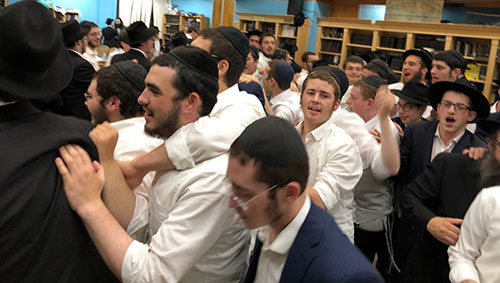A yungerman, a visitor it seemed (from the style of his beard), had his smartphone out to capture a moment he wished to preserve. The bachurim saved him from his phone and swept him up in the revelry. * I too had my smartphone out, broadcasting live the only sign of Jewish life literally for thousands of miles to the west and hundreds to the east…
By Rabbi Boruch Merkur

It was clearly a dismissive gesture, not the warm greeting you’d expect of a Chassid, a friend seen only occasionally.
Tishrei was kicking off in the biggest way. It was the first night of Slichos and the Toronto yeshiva was on wheels, singing and dancing well past 2 AM. The vast majority – even among Chabadniks – were dozing off by this time.
A yungerman, a visitor it seemed (from the style of his beard), had his smartphone out to capture a moment he wished to preserve. The bachurim saved him from his phone and swept him up in the revelry.
I too had my smartphone out, broadcasting live the only sign of Jewish life literally for thousands of miles to the west and hundreds to the east.
This was a good friend questioning me, my seeming absence, my unmindfulness. Clearly he was telling me: Be present! Put away your stupid phone!
What a throwback – and from such an unlikely source. This person is a professional, a longtime baal t’shuva, an old friend who happens to be a revolutionary in chinuch. Old school clearly lingers even in the most progressive.
True, the evils of smartphones are well known. Yet does anyone remember our intrepid leader’s approach to technology (at least when it comes to outreach)? Have we completely forgotten what our mission is in this world?
Our Rebbe is a leader who acknowledges and blesses even the cameramen of journalists who came to interview him. The Rebbe’s message to the world is simple – add a little more in goodness and kindness to bring Moshiach – yet he demands the utmost publicity. Moshiach reported in the papers, indeed!
***
I have often wondered what defines the model Chassid. There are so many varieties, but there are two general strains. There are Chassidim who only wish to reflect and embody the Rebbe, transcending themselves completely, including their own personalities. Then there are those who simply wish to be genuine devotees, Chassidim who strive to be themselves and use their unique personalities to further the Rebbe’s goals.
Last Shabbos, Rabbi Noam Wagner farbrenged for the Mesivta here in Toronto. He was on fire, as you would expect. He’s still screaming about the table set to celebrate the Redemption. All we have to do is open our eyes to see the Leviason, Shor HaBar, and Yayin HaMeshumar… On a more personal level, he went further. You are Rebbe! he screamed repeatedly.
Me, the Rebbe?! Thank goodness it was Shabbos and the smartphones were still tucked away. This farbrengen was not getting broadcast.
***
In the maamer Ki Naar Yisroel V’Ohaveihu of 5666, the Rebbe Rashab, nishmaso Eden, speaks of two levels of G-d’s love for the Jewish people as “naar,” typically understood to mean youth or a young child, as it says: “There is no love like the love of a young child” (Zohar III 277b). This is a genuine, selfless love inherent to all people and directed to children who are not even related.
Yet there are two meanings of “naar” that are almost opposite. “Naar” means katnus, youth, being small, diminutive, but it also means meshares, servant, a disciple who totally embodies his master, reflecting the mashpia as a full moon reflects the light of the sun – or even the light of the sun itself.
Throughout the life of Moshe Rabbeinu, Yehoshua was his meshares, “naar, lo yamish mitoch ha’ohel – a lad, who never left the tent” of Moshe, his master. In the words of the Rebbe, nishmaso Eden, meshares is a state of
bittul and the total dissolution of self. Yehoshua was no more than a recipient from Moshe. That is, he received hashpaa (teachings, influence) through the sensibilities of Moshe himself, not according to his own abilities and faculties … a state of bittul without any self-awareness at all. (Maamer Ki Naar 5666, pg. 577-578)
This is a Chassid, a disciple, who simply absorbs, offering nothing of his own (not even his own interpretation), a faithful reflection of the source.
But after 120 years, when Moshe passed the mantle of leadership on to Yehoshua, Yehoshua for the first time was forced to shine on his own. True he was not the sun. He wasn’t even the moon in its full glory. Here was a man who until now did virtually nothing but listen. Now the voice was his own.
Yehoshua was a moon that had waned, a naar, a katan – yet “v’ohaveihu,” G-d loves him, the “youngest,” most of all. Thus, Yehoshua was chosen to lead the Jewish people into the holy land, fulfilling the ultimate purpose to make a dwelling place for G-d in the world.
Yehoshua could not have done it were it not for his total bittul, yet the whole point of that preparatory stage was to empower him to find his true self and shine on his own.
The Rebbe demands of his Chassidim to find their own voice, especially after the 28th of Nissan 5751. If we did nothing but reflect the Rebbe for decades, now is the time to follow the Rebbe’s radical and urgent model of rising up to settle and conquer the world, and to use all our personality – as well as all the resources at our fingertips – to do so. Moshiach now! ■